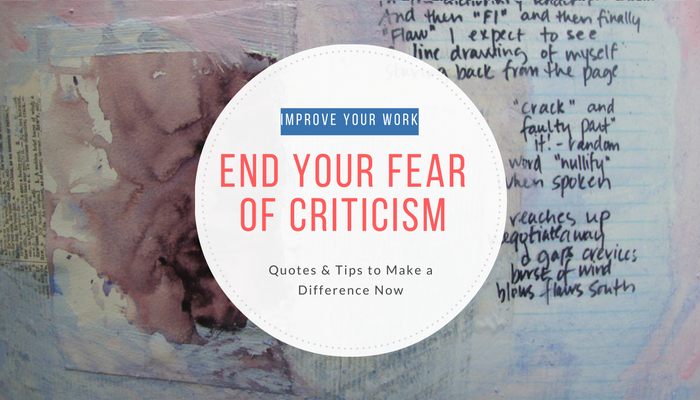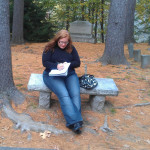
Don’t let fear take over your best work. Befriend criticism to take improve your work and have a bigger impact.
One of the most worrisome challenges for many writers and artists is the fear of criticism.
I want to prove to you I know criticism well. There was this time when criticism hurt the most. Here’s what happened.
I thought the work I had done was brilliant. I was ready to perform and wow everyone. I couldn’t wait for “sure to follow” praise.
What I wasn’t expecting was to have the work I had done fail from my acting teacher’s perspective
Instead, the critique came labeled absolute failure. Could the criticism be any worse?
My teacher told me to lie down on my back and re-speak my monologue, line for line, with no emotion. He wanted it spoken without emphasis, one sentence at a time.
And I couldn’t cry. I wouldn’t cry. If I cried, that would mean I believed I was a failure and I might not be brave enough to come back to class.
For a cryer-emoter like me, this felt like torture. I was unprepared for the criticism my teacher offered. “I don’t buy it,” he said. “You aren’t being real.”
Eventually I saw this same criticism as an enormous gift.
I did what my teacher told me. I spoke my monologue from the floor. I allowed myself to fail well through criticism and returned to class the next week for more instruction, for more improvement, for more growth as both an actor and as a human. “This is what I would tell my coaching clients to do,” I reminded myself.
Guess what happened next?
I chose to improve from the criticism I received. I continued to practice. I auditioned for roles – some I’ve gotten and some I haven’t.
I’ve won acting awards. I’ve been in countless plays, some music videos, done some film work. I’ve directed and written.
I’ve taken the criticism I received and used it to improve, just as I have with my writing and mixed media art.
I changed my relationship with criticism, made it work for me rather than allowed fear and other emotional attachments to get in the way of future success.
If I never went back to that acting class – which would have been my usual pattern – the “What if I had?” would hold me in improvement limbo.
How might you apply what I learned that day and continue to practice every day of my life?
- Listen to the criticism offered fully and ask yourself, “Where is the truth in the critique?”
- Be aware of who is offering the criticism. Is it someone who is an expert in the field? Is this person offering objective or subjective critique? Where is the value in the criticism?
- Most importantly, continue to show up and do what it is you love to do. Few of us, if any, begin as masters of the craft. This was an important lesson from my acting class – that even though I had raw talent and the building blocks of being a decent actor, there was still so much room to grow.
Usually when I tell the story of how I came back to acting after thirty years away, I share about the transcendent moment that came in the class session right before this one. Welcome to the rest of my story, when things got even better.
This was the moment in my life when I finally learned to accept criticism as a means to improve and a way to grow into this always continuing to achieve more version of myself. If I had stayed afraid of criticism, I would never continue acting. We get notes EVERY night at rehearsal. It is a nightly opportunity to get critiqued and the primary focus is fixing the mistakes you’re making rather than praising the moments you did well. As an actor, if you can’t take that, you’re sunk.
I have included several prompts for you to use for writing or other forms of creative expression including contemplative thought and conversation among friends and broadcasting or video. If you happen to use the prompts to make anything you post online, I would love for you to link back to this post as a way to say THANK YOU!
PROMPT: Remember a time you received criticism. What happened next?
Use the phrase, “I remember” to start your writing and then just let your words flow across the page without editing, forethought or planning.
Stay with this perspective of criticism just like I stayed with my acting class, even though I was initially humiliated by criticism.
I have offered you some alternative prompts in case the first one didn’t resonate entirely.
Prompt: I remember the time I was criticized. It felt….
I remember the time I was criticized (describe the critique). It felt…. and in response I….
These quote sources may also help, especially if you choose to turn your writing into an essay, blogpost, video, live broadcast or a chapter in a book.
99 Motivational Quotes to Help You Deal with Criticism from Inc.com
34 Inspiring Quotes on Criticism (and how to Handle It) from PositivityBlog.com
17 Quotes: Forget the Critic and Believe in Yourself (from the Muse.com)
The rest of the rest of the story is this:
My original acting teacher and I last worked together five or six years ago. He called me and said something like this, “I am calling to beg you to take a role in….” and I did. The woman who wrote the play told me afterwards my portrayal pleased her more than any of the other actors who shared the stage with me, but that praise mattered less than the fact I enjoyed myself completely and have stories to tell I didn’t have before.
I am on hiatus from stage and screen and am making a list of who I want to work with the next time I opt onto the stage. My acting teacher is on the list.
Here’s to more powerful criticism and even more growth for you. This post was inspired by a live broadcast created for the Peri10K.com community. If you are interested in being a part of a carefully curated, collaborative mastermind of thought leaders & world changers who aim to create the most inspiring content online, visit peri10k.com/join to be put on the waitlist and notified when the group re-opens to new members.

Here I am writing by the graveside of Louisa May Alcott, the author of Little Women – a highly successful book that hasn’t been out of print since it was published more than 100 years ago.
Julie Jordan Scott inspires people to experience artistic rebirth via her programs, playshops, books, performances and simply being herself out in the world. She is a writer, creative life coach, speaker, performance poet, Mommy-extraordinaire and mixed media artist whose Writing Camps and Writing Playgrounds permanently transform people’s creative lives. Watch for the announcement of new programs coming in soon!
Contact Julie now to schedule a Writing or Creative Life Coaching Session, call or text her at 661.444.2735.
Check out the links below to follow her on a bunch of different social media channels, especially if you find the idea of a Word-Love Party bus particularly enticing.
Please stay in touch: Follow me on Twitter: @JulieJordanScot and on Periscope
Be sure to “Like” WritingCampwithJJS on Facebook. (Thank you!)
Follow on Instagram And naturally, on Pinterest, too! © 2016